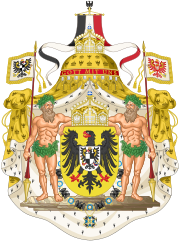
The House of Hohenzollern is a formerly royal German dynasty whose members were variously princes, electors, kings and emperors of Hohenzollern, Brandenburg, Prussia, the German Empire, and Romania. The family came from the area around the town of Hechingen in Swabia during the late 11th century and took their name from Hohenzollern Castle. The first ancestors of the Hohenzollerns were mentioned in 1061.

Frederick William II was King of Prussia from 1786 until his death in 1797. He was in personal union with the prince-elector of Brandenburg and sovereign prince of the Canton of Neuchâtel. As a defensive reaction to the French Revolution, Frederick William II ended the German Dualism between Prussia and Austria. Domestically, he turned away from the enlightened style of government of his predecessor and introduced a tightened system of censorship and religious control. The king was an important patron of the arts especially in the field of music. As a skilled cellist he enjoyed the dedication of various cello-centric compositions by composers Mozart, Haydn, Boccherini, and Beethoven. He was also responsible for some of the most notable architecture in Prussia, including the Brandenburg Gate in Berlin, the Marble Palace, and Orangery in the New Garden, Potsdam.

Frederick William III was King of Prussia from 16 November 1797 until his death in 1840. He was concurrently Elector of Brandenburg in the Holy Roman Empire until 6 August 1806, when the empire was dissolved.

Prince Frederick Henry Ludwig of Prussia was a Prussian general, statesman, and diplomat. He was a son of King Frederick William I of Prussia and Princess Sophia Dorothea of Hanover, and the younger brother of Frederick the Great. Prince Henry led Prussian armies in the Silesian Wars and the Seven Years' War, having never lost a battle in the latter. In 1786, he was suggested as a candidate to be a monarch in the United States.

Prince Albert of Prussia was a Prussian general field marshal, Herrenmeister of the Order of Saint John from 1883 until his death, and regent of the Duchy of Brunswick from 1885, also until his death.

The Bailiwick of Brandenburg of the Chivalric Order of Saint John of the Hospital at Jerusalem, commonly known as the Order of Saint John or the Johanniter Order, is the German Protestant branch of the Knights Hospitaller, the oldest surviving chivalric order, which generally is considered to have been founded at Jerusalem in 1099.

The Order of the Black Eagle was the highest order of chivalry in the Kingdom of Prussia. The order was founded on 17 January 1701 by Elector Friedrich III of Brandenburg. In his Dutch exile after World War I, deposed Emperor Wilhelm II continued to award the order to his family. He made his second wife, Princess Hermine Reuss of Greiz, a Lady in the Order of the Black Eagle.

Prince Friedrich Wilhelm Karl of Prussia was the son of Frederick William II of Prussia and Frederika Louisa of Hesse-Darmstadt.
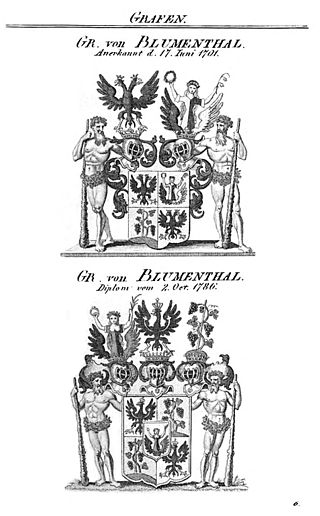
The Blumenthal family is a Lutheran and Roman Catholic German noble family, originally from Brandenburg-Prussia. Other (unrelated) families of this name exist in Switzerland and formerly in Russia, and many unrelated families called Blumenthal, without "von", are to be found worldwide.

Prince Frederick Louis Christian "Ferdinand" of Prussia, was a Prussian prince, soldier, composer and pianist. Prince Louis Ferdinand fought in the Napoleonic Wars. The 1927 German film Prinz Louis Ferdinand was a biopic of his life.
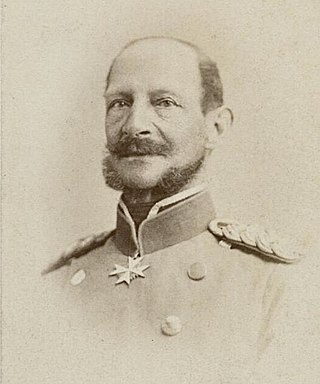
Prince Frederick Henry Albert of Prussia was the fifth son and youngest child of King Frederick William III of Prussia and Louise of Mecklenburg-Strelitz. His parents had fled to East Prussia after the occupation of Berlin by Napoleon, and Albert was born in Königsberg. Two of Albert's elder brothers were Frederick William IV, King of Prussia from 1840 till 1861, and William I, King of Prussia from 1861 to 1888 and German Emperor from 1871 until 1888.

Prince Augustus Ferdinand of Prussia was a Prussian prince and general, as well as Herrenmeister of the Bailiwick of Brandenburg of the Order of Saint John. He belonged to the House of Hohenzollern, and was the youngest son of Frederick William I of Prussia by his wife, Queen Sophia Dorothea.

The Pfuel family, also known as Pfuhl or Phull, is an ancient German noble family with a history that traces back to the year 926 when they first arrived in Brandenburg with King Henry the Fowler, who started governing the region in 928–929, allowing Emperor Otto I to establish the Northern March in 936 during the German Ostsiedlung. Over the centuries, the Pfuel extended their influence across various regions including Saxony, Saxony-Anhalt, Mecklenburg, Pomerania, Württemberg, Westphalia, Eastern Europe, and Sweden.

Princess and Margravine Anna Elisabeth Louise of Brandenburg-Schwedt was a Prussian princess by marriage to her uncle Prince Augustus Ferdinand of Prussia. She was a daughter of Margrave Frederick William of Brandenburg-Schwedt and Princess Sophia Dorothea of Prussia.

Friedrich August Eberhard, Prince of Württemberg was a royal Prussian Colonel General of the Cavalry with the rank of Generalfeldmarschall and Kommandierender General of the Guards Corps for more than 20 years. August was a member of the House of Württemberg and a Prince of Württemberg by birth.
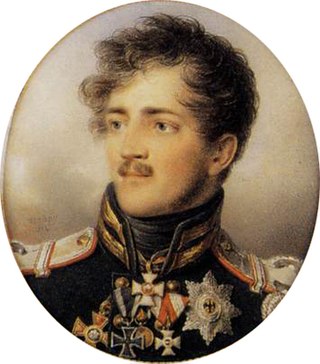
Prince Frederick William Henry Augustus of Prussia was a Prussian royal and general. Born on Friedrichsfelde Palace, he was the youngest son of Prince Augustus Ferdinand of Prussia, the brother of King Frederick the Great, and Margravine Elisabeth Louise of Brandenburg-Schwedt.

Jean de Forcade de Biaix, aka Jean de Forcade, Marquis de Biaix, aka Jean-Quirin de Forcade de Biaix, aka Jean Quérin von Forcade, Herr von Biaix, aka Johann Querin de Forcade, Herr zu Biaix, aka Johann Quirin von Forkade de Biaix, was a Huguenot, a descendant of the noble family of Forcade and Lieutenant General in the service of the Kingdom of Prussia. He was the Regimentschef of the 23rd Prussian Infantry Regiment, Commandant of the Royal Residence in Berlin, Gouverneur militaire of Berlin, a Knight of the Order of the Black Eagle a member of King Frederick I of Prussia's "Tobacco Collegium". and president of the Grand Directoire 1718–1729, the deliberative and decision-making body responsible for all Huguenot affairs in the kingdom.
Friedrich Wilhelm Leopold Konstantin Quirin Freiherr von Forcade de Biaix, aka Friedrich Wilhelm Leopold Konstantin Quirin von Forcade de Biaix, Herr of Schleibitz, Hamm, Groß-Naedlitz and Loslau, aka the Baron von Forcade,, Royal Prussian Major, Knight of the Iron Cross 2nd Class on 26 August 1813, knighted by His Majesty Frederick William III of Prussia as Knight of the Order of Saint John in 1817, Royal Prussian Chamberlain (Kammerherr) and Castellan (Drost) of Neuenrade in the County of Mark, after his father's death in 1808. He was also a publisher, author, and theater director.

Prince Friedrich Heinrich Albrecht, Prince of Prussia was a Prussian officer, member of the house of Hohenzollern, and a great-grandson of Friedrich Wilhelm III of Prussia. He was persecuted for being homosexual.
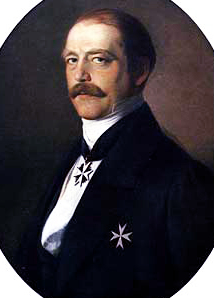
The Royal Prussian Order of Saint John was an order of merit in the Kingdom of Prussia. It was set up in 1812 and was awarded until the inauguration of the modern Order of Saint John in 1852.

